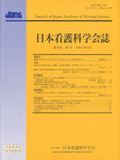Japanese
English
- 販売していません
- Abstract 文献概要
- 参考文献 Reference
- サイト内被引用 Cited by
要旨
目的:本研究の目的は,母親の育児幸福感を高めるための,2時間程度の少人数参加型プログラムを開発し評価することである.
方法:プレテスト後,プログラムを7人1グループに2回実施した.プログラムに参加した14名に対しプログラムの前と後および1週間後の心理学的指標による気分や幸福実感,育児幸福感や育児ストレス,生理学的指標によりリラックスやストレスの評価をした.
結果:心理学的な気分の変化では,“不安感”“緊張と興奮”が低下していた.育児ストレスは,“子どもの発達に対する懸念”が低下し,“夫の育児サポート不十分”が上昇していた.育児幸福感では,“子どもからの感謝と癒し”が上昇していた.生理学的には,心拍数の低下,HFの上昇が認められた.脳波では,θ波,β波が低下し,α波の中でも特にα3波が上昇しリラックスの効果が認められた.また,母親自身の視野の広がりや安心感,託児による母親の心のゆとりが生じ,子どもとの関係の見直しにより子どもへの愛着や成長を実感していた.
結論:今後は継続的なコースによるプログラムの展開と,その後の縦断的な育児幸福感の変化の評価が課題である.
Abstract
Purpose: We developed and evaluated a 2-hour program for mothers in order to increase the level of happiness in raising their children.
Method: Following a pretest, we conducted this program twice with 14 mothers (7 mothers per group), and evaluated differences in psychological indicators such as mood and feelings of happiness and stress in raising children, and in physiological indicators such as levels of relaxation and stress. These indicators were assessed before, immediately after, and a week after their participation in the program.
Results: With respect to mood change, “anxiety” decreased, while “energy and excitement” decreased. Regarding parenting stress, “worrying about the development of their children” decreased. At the same time, with respect to their child care happiness, mothers demonstrated more “appreciation from their children and a sense of healing,” and felt that there was “not enough support from their husband in raising children.” In terms of physiological indicators, we detected a decrease in heart rate and an increase in HF. Brain waves showed a decrease in θ-waves and β-waves and an increase in α-waves (in particular α3-waves), which indicates a relaxing effect. In addition, by helping to broaden the mothers' perspective and sense of reassurance and breadth of mind through day-care services, the mothers were able to express love towards their children and experience growth within themselves through the reexamination of their relationship with their children.
Conclusion: In the future, we hope to develop this program into a continuous course and use cross-sectional assessments to evaluate the program.
Copyright © 2009, Japan Academy of Nursing Science. All rights reserved.


